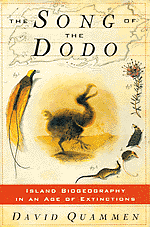 |
Natural Selection
What To Read On The Way To The Boneyard.
By Gregory McNamee
Song of the Dodo, by David Quammen (Scribner).
Hardcover, $32.50.
ONETIME TUCSONAN David Quammen has given us several books
with The Song of the Dodo, which weighs in at more than
700 pages--all of them uncommonly well written and admirably instructive.
At the first and simplest level, Quammen delivers a book of literary
travel, taking the reader to exotic locales like Bali, Mauritius,
Iceland, Galapagos, Madagascar. At another, he offers a finely
detailed journalistic account of how ecological science is done,
how close fieldwork combines with theoretical reflection to advance
our understanding of the natural world. At another, he charts
the grim course of extinctions on this chewed-up planet. At still
another, Quammen presents an accessible explanation of Robert
MacArthur and E.O. Wilson's highly influential theory of island
biogeography, which has revolutionized population biology since
its publication in 1967. And Quammen manages, against the odds,
to merge these discussions--and much more--into a single, coherent
narrative.
Islands are, by tautological definition, geographically isolated:
bits of land, large or small, separated from other bits of land
by water. That isolation, Quammen remarks, quoting the biologist
Ernst Mayr, is "the flywheel of evolution": On islands,
animal and plant species separate and transform more markedly
than elsewhere. Among MacArthur and Wilson's contributions was
the metaphorical extension of this commonplace to island-like
areas: mountain tops, say, or more pointedly, parks and wilderness
areas surrounded by developed landscapes. The more space available,
the greater the number of species that will develop, an insight
that has been of critical importance lately in the debate over
designating federally protected wilderness in the continental
United States and elsewhere, now a checkerboard of the wild and
the paved or plowed.
 Small islands lose more species by extinction than do large ones,
Quammen observes at several points in his book, and if we wish
life to thrive in all its diversity, then we will have to make
large islands in the land where no islands, or small ones, now
exist. This is an obvious enough observation, but one that may
find little room in an economy driven by notions of growth, in
a world where the population of Homo sapiens is expanding
by frightening logarithmic leaps.
Small islands lose more species by extinction than do large ones,
Quammen observes at several points in his book, and if we wish
life to thrive in all its diversity, then we will have to make
large islands in the land where no islands, or small ones, now
exist. This is an obvious enough observation, but one that may
find little room in an economy driven by notions of growth, in
a world where the population of Homo sapiens is expanding
by frightening logarithmic leaps.
Along the way, Quammen gives us thumbnail biographies of important
figures like Charles Darwin and the often overlooked naturalist
Alfred Wallace, whose 1857 paper "On the Natural History
of the Aru Islands"--now "interred, like a Gnostic gospel,
in a cave of oblivion"--set biological theory on a new course.
Wallace's contributions were obscured, Quammen writes, partly
thanks to Darwin's own machinations, which the author does not
hesitate to suggest were "scummy behavior."
You will learn, reading Quammen's book, that Komodo dragons evolved
to feed on a diet of elephants; that, in a wonderfully clear discussion
of genetic theory, "a gene is a rubric that can be embodied
in various ways"; that the slightest tinkering with the chain
of being can cause the disappearance of a species; and that the
call of Raphus cucullatus, the dodo, extinct since 1690,
"is forever unknowable because no human from whom we have
testimony ever took the trouble to sit in the Mauritian forest
and listen"--an object lesson of universal application, and
one that ought to be introduced into the discussion the next time
Congressional radicals try to dismember the Endangered Species
Act.
You will also learn, depressingly enough, that "the current
cataclysm of extinctions is...likely to stand among the worst
half-dozen such events in the history of life on Earth."
Allowing that it is possible to change this course, but unlikely,
Quammen invites us to take comfort in the fact that we humans
will almost certainly be among the species we escort to evolution's
boneyard, and that the Earth will survive and recover--in, say,
20 or 30 million years.

|
 |
